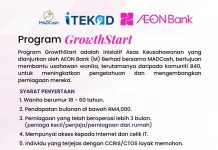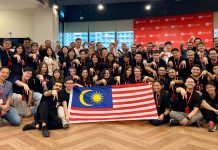Highlights:
- Noraini Ahmad first woman to chair PAC
- Maybank to increase mortgage, SME loans in three years
- MIDF forecasts Malaysia’s IPI growth of 2.9 per cent for 2019
- KL becomes capital of Asian football industry
- Modi favourite as India’s election begins
- Finance Apps Report Shows Gender Gap is Closing for User Engagement
- Six in Ten Consumers in Singapore Willing to Share Significant Personal Data with Banks and Insurers
Noraini Ahmad new PAC chairman, first woman to hold post
Parit Sulong MP Datuk Dr Noraini Ahmad (pic) of the Barisan Nasional is the new chairman of the Public Accounts Committee (PAC), the first woman to hold the post. She takes over from Beluran MP Datuk Seri Dr Ronald Kiandee who resigned from UMNO on March 15 and joined Bersatu. After the motion was tabled, Noraini received the unanimous support of the Dewan Rakyat.
Maybank to increase mortgage, SME loans in three years
Malayan Banking targets to increase its loan disbursement for both mortgages and small and medium enterprises (SMEs) to RM35 billion and RM50 billion, respectively, in the next three years. Group president and chief executive officer Datuk Abdul Farid Alias said the bank had disbursed about RM12.2 billion in mortgage loans last year and planned to grow this to about RM50 billion in the next three years. “Our approval rate for mortgage as of March is at 80 per cent compared to the industry’s approval rate at 70 per cent. “So, the industry has been supporting the borrowers, especially those who need to find a home,” he told reporters in Kuala Lumpur. Currently, business banking stands at RM24 billion while retail SME amounts to RM17.1 billion.
MIDF forecasts IPI growth of 2.9 per cent for 2019
MIDF Research has forecast Malaysia’s industrial production index (IPI) to record growth of 2.9 per cent for 2019. “We believe Malaysia’s IPI will be growing at between three per cent to four per cent during the first half of 2019. “Based on the Business Tendency Survey data, the services and manufacturing sectors are expected to continue to drive up Malaysia’s economy, while mining is predicted to recover modestly,” the research house said in a note. Malaysia’s IPI grew by only 1.7 per cent year-on-year (y-o-y) in February 2019 as the manufacturing and electricity sector index expanded at a softer pace. Mining posted a larger negative growth, as factory output grew 3.7 per cent y-o-y, moderating from 4.1 per cent y-o-y in the prior month. The slowdown in the IPI was amid a weak external trade performance and in tandem with the slowdown of Malaysia’s external trade in February 2019. However, looking ahead, it saw Malaysia’s IPI performance as remaining in a good position. This is due to firm domestic demand and a stable job market, which would support domestic-oriented industries, particularly consumer-based products. It would in addition be supported by steady global demand, particularly in the US and China, besides a gradual pick-up in global commodity prices and currencies.
Kuala Lumpur Becomes the Capital of the Asian Football Industry
On 29th and 30th April, the first edition of World Football Summit Asia (WFS Asia) will connect close to 2,000 professionals from the sports and football industry to discuss the most relevant industry topics and generate business opportunities in Kuala Lumpur, Malaysia. The two-day summit will gather international participants from more than 50 different countries. It is expected to host more than 22 exhibitors where 70% of them will be executives and accompanied by more than 70 football clubs, turning the summit into a congregation of who-is-who of the Asian and international football industry. The components of the summit will include both a main stage and industry talks which companies and clubs will share, discuss and present their ideas, industry trends to audiences, an expo area where companies will exhibit and showcase their latest products and services, a networking area in which certain platforms will be offered for attendees to meet and generate opportunities and the StartCup, a competition in which a selection of 7 startups will pitch their business idea to entrepreneurs, investors, companies and media.
Modi favourite as India’s election begins
India’s election, the biggest in history, kicked off today with Prime Minister Narendra Modi seeking a second term from the 900 million voters. Opinion polls put Modi, 68, as the favourite but he faces a tough challenge from two scions of India’s storied Nehru-Gandhi dynasty attempting to capitalise on his poor record on jobs and rural poverty. The contest in the vast country of 1.3 billion people is dominated by local issues but also viewed as a referendum on Prime Minister, Narendra Modi, who rode a wave of popularity five years ago to become the first leader of a majority government in decades. Polls are now open in 91 seats, about a sixth of the total in the Indian parliament’s lower house, with six more voting days to be held before the results are announced on 23 May.
Finance Apps Report Shows Gender Gap is Closing for User Engagement
A report from mobile app marketing and retargeting platform, Liftoff, reveals that the gender gap in finance app engagement rates is closing. The 2019 Mobile Finance Apps Report provides data on various aspects of finance apps, covering everything from the cost of user acquisition and conversion rates, to user engagement rates across regions. The extensive report draws from internal data spanning 10.3 billion impressions across 2.7 million app installs, 168 million clicks and 1.7 million activations and registrations. APAC continues to lead in mobile finance apps adoption. The cost to acquire a user who completes a registration has significantly decreased between 2017 and 2018, from $27.81 to only $20.67, making it the cheapest compared to NA and EMEA. As a multitude of finance apps continue to serve the unbanked populations of the region and disrupt traditional methods of banking, mobile marketers have a huge opportunity to focus on targeting users in APAC who are not only cheaper to acquire, but also easier to engage.
Six in Ten Consumers in Singapore Willing to Share Significant Personal Data with Banks and Insurers in Exchange for Lower Pricing, Accenture Study Finds
in ten consumers in Singapore would be willing to share significant personal information, such as location data and lifestyle information, with their bank and insurer in exchange for lower pricing on products and services, according to a new report from Accenture. The data is part of Accenture’s global Financial Services Consumer Study, which was based on a survey of 47,000 consumers in 28 markets and also found that more than half of Singaporean consumers would share that data for benefits including more-rapid loan approvals, discounts on gym memberships and personalized offers based on current location. At the same time, however, consumers believe that privacy is paramount, with nearly three-quarters (71 percent) saying they are very cautious about the privacy of their personal data. In fact, data security breaches were the second-biggest concern for consumers, behind only increasing costs, when asked what would make them leave their bank or insurer.
























